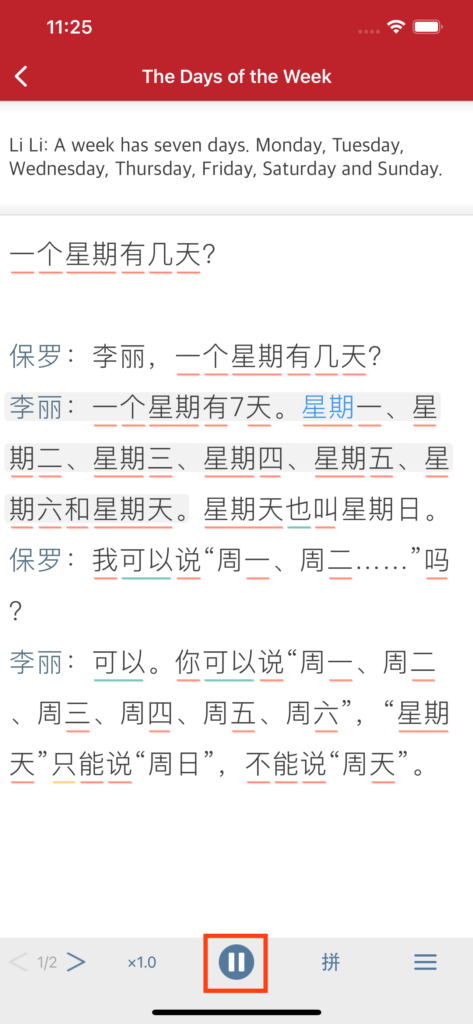10 Things to do to get better at Chinese
When it comes to learning a new language, there are 4 skills to consider: Listening, Speaking, Reading, and Writing. With Du Chinese, you can practice each aspect of the language and you will see your Chinese skills improve drastically. Follow these tips and you’ll Master Chinese in no time.
Reading
1. Read at a comfortable level
Based on the Extensive Reading (ER) approach, when you find yourself in between levels, we always recommend leaning towards lessons that are easier for you. By reading at a more comfortable level, it will allow you to consume a larger quantity of material, which will help long term language acquisition.
2. Know when to use pinyin
When you’re first starting out, pinyin is very useful for learning the different sounds and tones in Chinese. As you become more proficient, try to gradually phase out pinyin to practice reading without it. Pinyin is a really great learning tool, but can also become a crutch.
Du Chinese has a setting called “Difficult words only”, which will automatically hide pinyin for words below the level of the story that you are reading.
3. Use flashcards
Flashcards are very helpful for short-term to long-term memory conversion. When you first encounter a new word, it is stored in your short-term memory bank. By reviewing new words with flashcards regularly, you can move this information into your long-term memory bank.

Listening
4. Listen to a lesson before you read
Listening is generally the first step of language comprehension. Without looking at your screen, use the background playback feature to listen to lessons “podcast-style” to see how much you can comprehend. Once you’ve listened to the full lesson, go back and read the story to see if you understood what you heard.
5. Read along
When you’re studying a lesson, hit that play button and read along to practice your listening and reading skills at the same time. According to the multi-sensory learning theory, the more senses you get involved, the easier it is for your brain to learn and retain the information.
Writing
6. Summarize and rewrite stories
To practice comprehension and forming sentences, after reading a story or article, try writing a short summary or review of what you just read. Some learners even rewrite the entire lesson to practice writing characters.
7. Use a notebook
Writing by hand can be helpful for memorizing characters and all it takes is a notebook and pen to use while you’re studying with Du Chinese. To practice writing, we recommend using a notebook to help you memorize new words, review what you’ve studied, and track your progress.
8. Practice Stroke order
An important tip is to learn the correct stroke order for each character and follow that (there are some general rules and patterns that will make it easier). You can jump to the stroke order of any character in Du Chinese by clicking the link that takes you to Pleco or by saving it to your word list and connecting to Skritter.

Speaking
9. Master your tones by reading aloud
Whenever possible, read aloud to help you improve your pronunciation and flow. When you practice speaking by reading aloud, you build confidence and will be able to speak with more fluency and expression.
10. Listen and repeat
Every lesson is recorded by a native speaker. Learners are exposed to authentic pronunciation and can practice their speaking skills by listening to and repeating sentences.
Bonus Tips
Give yourself a Reminder to Study – We recommend turning on notifications so you know when new content is released and you keep Chinese learning at the top of mind. Adding an event in your phone’s calendar can also be helpful.
Create a Habit & Set Attainable Goals – Studying 10 minutes every day is more effective than studying one hour once per week. Rather than studying Chinese off and on, try to create a habit to practice regularly. We recommend having a weekly goal both for the number of lessons you read and flashcards you review. For example, you can try to study one lesson every day or review 20 flashcards.
That’s it! If you are just starting out, here are some tips for HSK 1 Level Readers.
Lessons:
- Elementary: Let’s Talk Later
- Upper Intermediate: The Map of Spicy Food in China
- Master: Addressing Seniors in the Workplace
Stories:
- Newbie: I’m a Cat 1: What is Home?
- Intermediate: Three Kingdoms Prologue: Oath of the Peach Garden
Courses:
- Elementary: Ben’s life in China 4: Trouble in Paradise
- Advanced: Watch Movies and Learn Chinese







